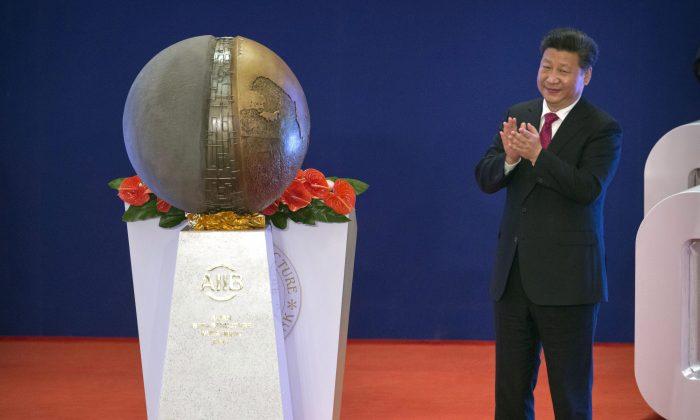With two Canadians behind bars in China on alleged espionage charges and disruptions to Canadian exports of canola and pork to China, news that a federal agency is sponsoring a Canada Day celebration in Beijing is being met with calls to cancel the event.
Demands to abandon the Canada Day-themed gala to be held on June 21 come amid a host of other steps the Official Opposition wants the government to take to signal that it’s not business as usual when China arrests Canadian citizens and harms Canadian business in apparent retaliation for the arrest of Huawei executive Meng Wanzhou on a U.S. extradition request.
China vs Canada’s Closest Ally
Pledging to join the AIIB was among the earliest initiatives taken by the Liberal government shortly after getting elected in October 2015, with cabinet approving the plan in December that year, in line with the new government’s strategy to form closer ties with China.Canada applied for and received approval for membership in 2017, with the budget bill that year allocating $256 million to purchase Canada’s shares in the bank.

“The major argument that seemed to be advanced in favour of the AIIB was that it would be good for our exports,” said Philip Cross, a senior fellow with the Macdonald-Laurier Institute. “Look at the state of Canadian trade with China today, with the trouble with canola and other commodities. Clearly, this has not paid off.”
Cross says the Chinese regime’s aim in founding an international development bank is to pivot the world economy toward China and away from the United States—a majority shareholder in the World Bank and in the Asian Development Fund with ally Japan. He questions the wisdom of Canada joining an initiative that its closest ally is opposed to.
“Are you fundamentally with the Americans or with the Chinese?” he says. Even in the face of difficulties renegotiating the NAFTA deal, he notes, the vast majority of Canadians would want to be aligned with the United States on the major issues of foreign and defence policy.
“Dealing with a regime like this is not worth it. There are just too many risks involved in dealing with an unstable, non-market-based regime like this.”
The path for Western countries to join the AIIB against Washington’s wishes was paved by the U.K., which became a founding member of the bank in 2015 thanks to the efforts of George Osborne, Britain’s China-friendly finance minister at the time. Osborne famously called for a “golden decade” between the U.K. and China.
Global Footprint, Control
With a 30 percent stake in the AIIB, China remains its largest shareholder, and with 26 percent of the voting rights, it is ensured veto power over major decisions, which require 75 percent consensus.Fred McMahon, a resident fellow at the Fraser Institute, says with the way the bank is set up at the moment, member countries should be able to evaluate different decisions and projects asking for funds, and sound alarm bells if they are concerned.
But he notes that there are valid long-term concerns with the AIIB because China is “not an ethical or moral player.”
Frank Xie, an associate professor in the School of Business Administration at the University of South Carolina, says Beijing’s aim with the AIIB is to increase its global footprint, especially in Asia, where Japan currently has the major say in the Asian Development Bank.
The main idea behind such regional multilateral investment banks is to provide low-interest loans to help developing countries build badly needed infrastructure.
‘Debt Diplomacy’
Xie adds that the AIIB initiative is closely linked to Beijing’s Belt and Road Initiative (BRI), a multi-continent infrastructure plan to establish China-centred land and maritime trade routes. The flagship plan is a key component of the Chinese Communist Party’s foreign policy, which it added to the Party’s constitution in 2017.Problems cited by critics concerned about the BRI include its purported use by Beijing as part of its “debt diplomacy,” where borrowers of Chinese loans tend to back China on the international stage, such as at the United Nations; allow increasing influence by China in their country; or give up control of key assets to the regime.

In an interview with the South China Morning Post, an AIIB executive said the bank makes its own assessments and decisions on projects independent of the BRI. A post on the BRI’s European website says that although not officially associated, the AIIB and BRI “are complementary.”
Under Beijing’s Shadow
Theoretically, to win contracts under the initiative, a company doesn’t necessarily need its host country to be a member of the AIIB. However, during testimony before the House of Commons Finance Committee in 2017, a government representative cited the higher likelihood of Canadian companies winning projects among the benefits of joining the organization. According to a report by National Post, so far only one Canadian company is known to have won a contract with an AIIB-funded project.Xie says China will not hesitate to wield its influence where it can to ensure its own companies become the dominant or sole players in the market. Chinese companies enter the market with predatory pricing thanks to state subsidies. This crushes international competition, as has been observed by Huawei’s dominance in Africa, he says.
Xie adds that in time, countries joining China in its initiatives will realize that they are “under the shadow of the Chinese communist government.”





